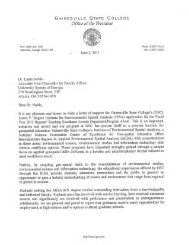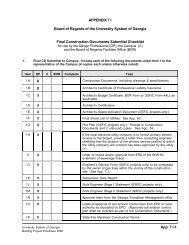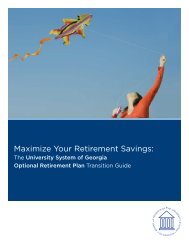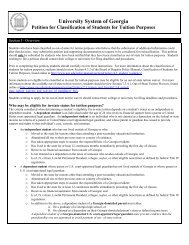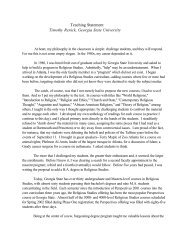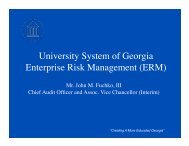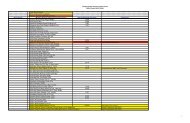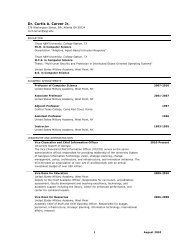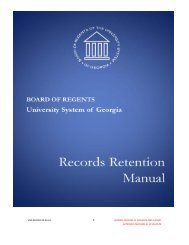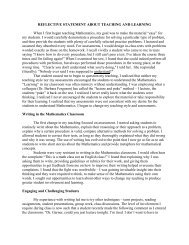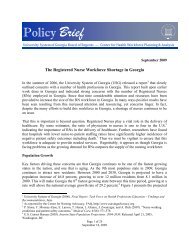WReier-Aviles on DSKGBLS3C1PROD with RULES266868 Federal Register / Vol. 75, No. 209 / Friday, October 29, 2010 / Rules and Regulationsauthorization as a religious institutionby State law in addition to the provision<strong>of</strong> the proposed regulations that theexemption by law, or exempt under theState’s constitution. We have alsoincluded a definition <strong>of</strong> a religiousinstitution, which provides that aninstitution is considered a religiousinstitution if it is owned, controlled,operated, and maintained by a religiousorganization lawfully operating as anonpr<strong>of</strong>it religious corporation andawards only religious degrees orreligious certificates including, but notlimited to, a certificate <strong>of</strong> Talmudicstudies, an associate <strong>of</strong> biblical studies,a bachelor <strong>of</strong> religious studies, a master<strong>of</strong> divinity, or a doctor <strong>of</strong> divinity. Wenote, however, that a religiousinstitution is still subject to therequirement in § 600.9(a)(1) <strong>of</strong> thesefinal regulations that, for the institutionto be considered to be legally authorizedin the State, the State must have aprocess to review and appropriately acton complaints concerning theinstitution.Tribal InstitutionsComment: One commenter suggestedthe <strong>Department</strong> should exempt fromState authorization any institutionestablished and operated by tribalgovernments. Three commenters statedthat the <strong>Department</strong> should recognizethat tribal institutions would not besubject to State oversight but instead thetribe would exercise oversight. One <strong>of</strong>those commenters suggested amendingthe regulations to add ‘‘tribal authority’’wherever State authority is mentionedin the proposed regulations.Discussion: We agree that tribalinstitutions are not subject to Stateoversight for institutions operatingwithin tribal lands. Proposed§ 600.9(a)(2) provided that a tribalcollege would be considered to meet thebasic provisions <strong>of</strong> proposed§ 600.9(a)(1) if it was authorized to <strong>of</strong>fereducational programs beyond secondaryeducation by an Indian tribe as definedin 25 U.S.C. 1802(2). However,proposed § 600.9(b), could be read asinappropriately making a tribalinstitution subject to adverse actions bythe State and a State process forhandling student complaints. We didnot intend to make a tribal institutionsubject to any State process for handlingcomplaints and have clarified thelanguage in § 600.9. If a tribal college islocated outside tribal lands within aState, or has a physical presence or<strong>of</strong>fers programs to students that arelocated outside tribal lands in a State,the tribal college must demonstrate thatit has the applicable State approvalsneeded in those circumstances.Changes: Section 600.9 has beenrevised to clarify the status <strong>of</strong> tribalinstitutions. As noted elsewhere in thispreamble, we have removed proposed§ 600.9(b)(2) regarding adverse actions.Further, we are providing that, in§ 600.9(a)(2)(ii) <strong>of</strong> the final regulations,the tribal government must have aprocess to review and appropriately acton complaints concerning a tribalinstitution and enforce applicable tribalrequirements or laws.Part 668 Student Assistance GeneralProvisions Retaking Coursework(§ 668.2)Comment: Many commenters agreedwith the Secretary’s proposal to amendthe definition <strong>of</strong> full-time student in§ 668.2(b) to allow repeated courseworkto count towards a student’s enrollmentstatus in term-based programs. Thecommenters believed the change wouldalleviate the administrative burdenrelated to tracking student courseworkto prevent payment based on repeatedcoursework, as is currently required.Discussion: The <strong>Department</strong> agreeswith the commenters that amending thedefinition <strong>of</strong> full-time student in§ 668.2(b) will be beneficial for studentswho retake coursework.Changes: None.Comment: Several commenters askedthe <strong>Department</strong> to clarify whetheramending the definition <strong>of</strong> full-timestudent will apply to all students,regardless <strong>of</strong> their enrollment status,including less-than-half-time, half-time,and three-quarter-time enrollmentstatuses.Discussion: Less-than-half-time, halftime,and three-quarter-time statuses aregenerally defined in relation to thedefinition <strong>of</strong> a full-time student. In§ 668.2 half-time and three-quarter-timestatuses generally are defined as at leastone-half and three quarters <strong>of</strong> theacademic workload <strong>of</strong> a full-timestudent, respectively. Less-than-halftimestatus is not defined, as the termis self-explanatory in its relationship tohalf-time and full-time statuses. Thus,including this provision in thedefinition <strong>of</strong> full-time student will applyto less-than-full-time students who areenrolled in term-based programs.Changes: None.Comment: Some commenters askedthe <strong>Department</strong> to allow earlyimplementation <strong>of</strong> this retakingcoursework provision, because the<strong>Department</strong>’s current guidance in theFederal Student Aid Handbook does notprovide for this benefit.Discussion: We have determined, as ageneral policy, that no provisions <strong>of</strong>these final regulations should bedesignated for early implementation.VerDate Mar2010 14:10 Oct 28, 2010 Jkt 223001 PO 00000 Frm 00038 Fmt 4701 Sfmt 4700 E:\FR\FM\29OCR2.SGM 29OCR2We will update the Handbook for the2011–2012 award year to reflect theamended definition <strong>of</strong> full-time studentin these final regulations.Changes: None.Comment: Some commentersquestioned whether institutions maycontinue to set their own policy inregards to retaking coursework andawarding credits for repeatedcoursework. One commenter asked the<strong>Department</strong> to clarify if the proposedregulation on retaking courseworkwould allow a student to repeat coursesalready passed to achieve a highergrade. Another commenter asked the<strong>Department</strong> to clarify whether a studentwho has already earned the maximumnumber <strong>of</strong> remedial courses allowedcould be paid to retake coursework ifthe student repeats more remedialcourses.Discussion: In general, the regulationsdo not affect an institution’s policiesgoverning whether a student may retakecoursework in term-based programs,including repeating courses to achieve ahigher grade, as these regulations applyonly to determining enrollment statusfor title IV, HEA program purposes.Moreover, the regulations do not limitan institution’s ability to establishpolicies for title IV, HEA programpurposes to the extent those policies arenot in conflict with title IV, HEAprogram requirements. However, withrespect to repeating courseworkpreviously passed by a student in aterm-based program, the student’senrollment status for title IV, HEApurposes may include any courseworkpreviously taken in the program, but weare limiting the provision so that it maynot include more than one repetition <strong>of</strong>a previously passed course or anyrepetition <strong>of</strong> previously passedcoursework that would be taken due toa student’s failure <strong>of</strong> other coursework.In other words, an institution may paya student one time for retakingpreviously passed coursework if, forexample, the student needed to meet anacademic standard for that particularcourse, such as a minimum grade.Conversely, an institution may not paya student for retaking previously passedcourses if the student is required toretake those courses because the studentfailed a different course in a prior term.For example, if a student enrolls in fourclasses in the fall semester and passesthree <strong>of</strong> them, the institution couldrequire the student to retake the failedclass and also require the student toretake the other three classes because <strong>of</strong>failing the one class. If the studentretakes the four classes in the springsemester, the failed class would beincluded in the student’s enrollment
Federal Register / Vol. 75, No. 209 / Friday, October 29, 2010 / Rules and Regulations66869WReier-Aviles on DSKGBLS3C1PROD with RULES2status, but the three classes passed inthe fall would not be included indetermining the student’s enrollmentstatus for the spring semester forpurposes <strong>of</strong> the title IV, HEA programs.We believe these revisions are necessaryto limit potential abuse from coursesbeing retaken multiple times, whileproviding institutions sufficientflexibility to meet the needs <strong>of</strong> moststudents.We would also note that aninstitution’s satisfactory academicprogress policy could further limit astudent from retaking coursework,because the credits associated with anycourse the student retakes count towardthe maximum time-frame requirement.The regulations do not affect the oneyearacademic limitation on noncreditand reduced-credit remedial courseworkunder § 668.20(d) and (f). For example,if a student repeats a remedial coursethat exceeds the one-year limitation, thecourse could not be considered in thestudent’s enrollment status.Changes: We have revised thedefinition <strong>of</strong> full-time student in§ 668.2(b) to provide that a student’senrollment status for a term-basedprogram may include repeating anycoursework previously taken in theprogram but may not include more thanone repetition <strong>of</strong> a previously passedcourse, or any repetition <strong>of</strong> a previouslypassed course due to the student’sfailing other coursework.Comment: One commenterrecommended that the change in thedefinition <strong>of</strong> full-time student should beexpanded to include nonstandard-termand nonterm programs.Discussion: Since the change in thedefinition applies to all term-basedprograms, the change would apply tostandard terms, including semesters,trimesters, and quarters, as well asnonstandard terms. Under the definition<strong>of</strong> a nonterm payment period in§ 668.4(c), a student’s coursework isdivided into payment periods based onthe hours and weeks <strong>of</strong> instructionaltime in the program. In general, underthese nonterm provisions a studentmust successfully complete the credit orclock hours in a payment period toadvance to the next payment period,and may not be paid for repeatingcoursework regardless <strong>of</strong> whether thestudent successfully completed it unlessthe provisions <strong>of</strong> § 668.4(g) apply.Changes: None.Written Arrangements (§§ 668.5 and668.43)GeneralComment: Several commenters agreedwith the proposed regulations relatingto written arrangements. Onecommenter commended the<strong>Department</strong>’s proposals on this topic,noting that they strike a fair balance inthe presence <strong>of</strong> many minutia-drivenconcerns. Some commenters stated thatthe proposed changes eliminateinconsistencies that exist in the currentregulations and provide betterinformation to students while allowinginstitutions to determine the best way todisseminate the required information.Other commenters stated that theyagreed with the proposed changes in§§ 668.5 and 668.43 because if aneligible institution enters into a writtenarrangement with another eligibleinstitution, under which the othereligible institution provides part <strong>of</strong> theeducational program to studentsenrolled in the first institution, it isimportant for all parties to have a clearunderstanding <strong>of</strong> which institution isproviding the credential and themajority <strong>of</strong> the education and training.Discussion: We appreciate thecommenters’ support <strong>of</strong> the proposedchanges reflected in §§ 668.5 and668.43.Changes: None.Written Arrangements Between Two orMore Eligible Institutions (§ 668.5(a))Comment: Some commenters objectedto the <strong>Department</strong>’s assertion—in thepreamble <strong>of</strong> the NPRM (75 FR 34806,34815)—that students who want to takemore than 50 percent <strong>of</strong> an educationalprogram at another institution couldtransfer to the institution that providesthe preponderance <strong>of</strong> the program’scoursework. One commenter stated thatstudents should be allowed to takecourses at more than one campus <strong>of</strong>eligible institutions that have a writtenarrangement without needing to gothrough unnecessary activities related totransfer <strong>of</strong> credit.Several commenters disagreed withthe proposed changes reflected in§ 668.5(a)(2)(ii). First, they argued thatimposing a limitation on the portion <strong>of</strong>an educational program one institutioncan provide under a writtenarrangement is not consistent with thepurpose <strong>of</strong> consortium agreements,which is to allow students to obtain adegree or certificate from theirinstitution <strong>of</strong> choice while allowingthem to satisfy course requirements bytaking courses delivered by anotherinstitution. Second, the commentersdisagreed with the limitation becausewe do not place similar restrictions oninstitutions when they accept transferstudents who have earned more thanhalf <strong>of</strong> the credits that will go towardtheir educational program at anotherinstitution. Finally, the commentersVerDate Mar2010 14:10 Oct 28, 2010 Jkt 223001 PO 00000 Frm 00039 Fmt 4701 Sfmt 4700 E:\FR\FM\29OCR2.SGM 29OCR2argued that more students are attendingmultiple institutions before completingtheir degree or certificate programs anda requirement that the credentialgrantinginstitution must provide 50percent <strong>of</strong> the individual student’seducational program would be a barrierto the students’ postsecondary success.In addition, a few commenters notedthat current articulation agreementsallow students to further their educationat another institution that may acceptenough credits on transfer that thestudent has less than 50 percent <strong>of</strong> theprogram remaining to be completed.Some commenters expressed the viewthat the proposed regulations governingwritten arrangements should not applyto articulation agreements while otherssought clarification <strong>of</strong> whether the<strong>Department</strong>’s position is that they doapply to such agreements. Commentersexpressed concern that the proposalwould result in undue hardship andfewer opportunities for students insmall communities who take a portion<strong>of</strong> their coursework locally. Onecommenter asked whether the proposedchanges reflected in § 668.5 affectstudents who obtained college creditwhile still in high school.Discussion: There appears to be someconfusion about the scope <strong>of</strong> theproposed changes to § 668.5. Underproposed § 668.5(a)(1), eligibleinstitutions that are not under commonownership may enter into a writtenarrangement (which may include thetype <strong>of</strong> consortium agreementsmentioned by the commenters) underwhich the non-degree-grantinginstitution <strong>of</strong>fers part <strong>of</strong> the degreegrantinginstitution’s educationalprogram; this provision does not imposea specific limitation on the portion <strong>of</strong>the educational program that may be<strong>of</strong>fered by the non-degree-grantinginstitution. In contrast, under proposed§ 668.5(a)(2)(ii), if a written arrangementis between two or more eligibleinstitutions that are under commonownership (i.e., are owned or controlledby the same individual, partnership orcorporation), the degree- or certificategrantinginstitution must provide morethan 50 percent <strong>of</strong> the educationalprogram. In this situation, a student isconsidered a regular student at thedegree- or certificate-granting institutionwhile taking a portion <strong>of</strong> theeducational program at anotherinstitution under common ownership.Under this regulatory framework, aconsortium agreement between twoeligible institutions that are not undercommon ownership is not subject to the50 percent limitation in § 668.5(a)(2)(ii).Moreover, § 668.5(a) does not apply toarticulation agreements under which
- Page 1 and 2: Friday,October 29, 2010Part IIDepar
- Page 3 and 4: Federal Register / Vol. 75, No. 209
- Page 6 and 7: 66836 Federal Register / Vol. 75, N
- Page 8 and 9: 66838 Federal Register / Vol. 75, N
- Page 10 and 11: WReier-Aviles on DSKGBLS3C1PROD wit
- Page 12 and 13: 66842 Federal Register / Vol. 75, N
- Page 14 and 15: 66844 Federal Register / Vol. 75, N
- Page 16 and 17: WReier-Aviles on DSKGBLS3C1PROD wit
- Page 18 and 19: 66848 Federal Register / Vol. 75, N
- Page 20 and 21: 66850 Federal Register / Vol. 75, N
- Page 22 and 23: WReier-Aviles on DSKGBLS3C1PROD wit
- Page 24 and 25: 66854 Federal Register / Vol. 75, N
- Page 26 and 27: WReier-Aviles on DSKGBLS3C1PROD wit
- Page 28 and 29: 66858 Federal Register / Vol. 75, N
- Page 30 and 31: 66860 Federal Register / Vol. 75, N
- Page 32 and 33: 66862 Federal Register / Vol. 75, N
- Page 34 and 35: 66864 Federal Register / Vol. 75, N
- Page 36 and 37: 66866 Federal Register / Vol. 75, N
- Page 40 and 41: WReier-Aviles on DSKGBLS3C1PROD wit
- Page 42 and 43: 66872 Federal Register / Vol. 75, N
- Page 44 and 45: WReier-Aviles on DSKGBLS3C1PROD wit
- Page 46 and 47: WReier-Aviles on DSKGBLS3C1PROD wit
- Page 48 and 49: WReier-Aviles on DSKGBLS3C1PROD wit
- Page 50 and 51: 66880 Federal Register / Vol. 75, N
- Page 52 and 53: WReier-Aviles on DSKGBLS3C1PROD wit
- Page 54 and 55: 66884 Federal Register / Vol. 75, N
- Page 56 and 57: 66886 Federal Register / Vol. 75, N
- Page 58 and 59: WReier-Aviles on DSKGBLS3C1PROD wit
- Page 60 and 61: WReier-Aviles on DSKGBLS3C1PROD wit
- Page 62 and 63: WReier-Aviles on DSKGBLS3C1PROD wit
- Page 64 and 65: WReier-Aviles on DSKGBLS3C1PROD wit
- Page 66 and 67: WReier-Aviles on DSKGBLS3C1PROD wit
- Page 68 and 69: WReier-Aviles on DSKGBLS3C1PROD wit
- Page 70 and 71: WReier-Aviles on DSKGBLS3C1PROD wit
- Page 72 and 73: 66902 Federal Register / Vol. 75, N
- Page 74 and 75: WReier-Aviles on DSKGBLS3C1PROD wit
- Page 76 and 77: WReier-Aviles on DSKGBLS3C1PROD wit
- Page 78 and 79: 66908 Federal Register / Vol. 75, N
- Page 80 and 81: WReier-Aviles on DSKGBLS3C1PROD wit
- Page 82 and 83: 66912 Federal Register / Vol. 75, N
- Page 84 and 85: WReier-Aviles on DSKGBLS3C1PROD wit
- Page 86 and 87: 66916 Federal Register / Vol. 75, N
- Page 88 and 89:
WReier-Aviles on DSKGBLS3C1PROD wit
- Page 90 and 91:
WReier-Aviles on DSKGBLS3C1PROD wit
- Page 92 and 93:
WReier-Aviles on DSKGBLS3C1PROD wit
- Page 94 and 95:
66924 Federal Register / Vol. 75, N
- Page 96 and 97:
WReier-Aviles on DSKGBLS3C1PROD wit
- Page 98 and 99:
66928 Federal Register / Vol. 75, N
- Page 100 and 101:
WReier-Aviles on DSKGBLS3C1PROD wit
- Page 102 and 103:
66932 Federal Register / Vol. 75, N
- Page 104 and 105:
WReier-Aviles on DSKGBLS3C1PROD wit
- Page 106 and 107:
66936 Federal Register / Vol. 75, N
- Page 108 and 109:
66938 Federal Register / Vol. 75, N
- Page 110 and 111:
66940 Federal Register / Vol. 75, N
- Page 112 and 113:
66942 Federal Register / Vol. 75, N
- Page 114 and 115:
66944 Federal Register / Vol. 75, N
- Page 116 and 117:
66946 Federal Register / Vol. 75, N
- Page 118 and 119:
WReier-Aviles on DSKGBLS3C1PROD wit
- Page 120 and 121:
WReier-Aviles on DSKGBLS3C1PROD wit
- Page 122 and 123:
WReier-Aviles on DSKGBLS3C1PROD wit
- Page 124 and 125:
66954 Federal Register / Vol. 75, N
- Page 126 and 127:
WReier-Aviles on DSKGBLS3C1PROD wit
- Page 128 and 129:
66958 Federal Register / Vol. 75, N
- Page 130 and 131:
66960 Federal Register / Vol. 75, N
- Page 132 and 133:
WReier-Aviles on DSKGBLS3C1PROD wit
- Page 134 and 135:
WReier-Aviles on DSKGBLS3C1PROD wit
- Page 136 and 137:
WReier-Aviles on DSKGBLS3C1PROD wit
- Page 138 and 139:
66968 Federal Register / Vol. 75, N
- Page 140 and 141:
66970 Federal Register / Vol. 75, N
- Page 142 and 143:
66972 Federal Register / Vol. 75, N
- Page 144 and 145:
66974 Federal Register / Vol. 75, N



